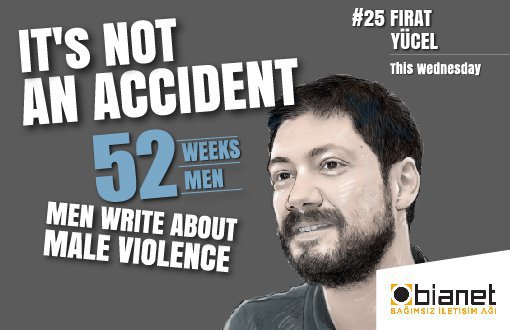Click to read the article in Turkish/Kurdish
I have an unfinished dissertation on the issue of confession and its renditions in cinema.
When I was working on this dissertation, I had realized that masculinity, as a gender, constructs itself with a retrospective look as much as daily life performances: with confession, confrontation, delayed regrets, reparation of hurt pride, a never-ending desire for forgiveness...
Laid before me I had a corpus of confessions stretching from Saint Augustine to Rousseau and of course countless individual bourgeois narratives (novel, memoir, self-help, etc.) of our present day.
And of course, there were the writings of theorists who probed the relationship between the performance of confession and the power, authority. Especially Michel Foucault, Kojin Karatani, Mark Nişanyan.
Those who emphasize that when attributing a positive role to confessions, apologies, regrets and compromises we should be mindful of their "timing"; that the confessions made at the opportune time become an instrument of vindication and of acquiring a role in the new power blocks...
On one hand I was grappling with these infinite intellectual materials, and on the other I was pondering what sort of a language this obsession with confession creates in cinema. Images and sounds were wandering in my mind, images and sounds which are mostly created by and pointing at men...
Bergman, Antonioni, Tarkovsky, Nuri Bilge Ceylan, Zeki Demirkubuz, Semih Kaplanoğlu...
The male figure, who after many years confronts his wrongdoings, mistakes, the things he did and could not do, and after lording it over (finally) sheds a tear...
The male characters who get melancholic while looking out the window...
Countless movies that focus on men's world of emotion... The men who look back and pour out their confessions on paper or film stock with the tools of the modern world...
I gradually started to ask the following questions: Why is it that in all these movies, critical reviews automatically attribute virtue to the reticent male figures who look into the distance, sigh and think, and only at the end of the movie unburden their hearts or don't unburden at all (as if it is only they who have comprehended the deep absurdity of life)?
Is it possible that in the background of men reigning over this artistic language that exposes the "human soul", there is not only instrumental domination and modern concerns such as being someone and going down in history, but also a sort of fear of being judged?
Is it possible that the reason why men are so prone to confession and inner-confrontation is because they are afraid of letting others evaluate their own lives?
How much does this have to do with wishes such as, making sense of your life on your own, returning to the field of language by yourself, determining your boundaries yourself, and preventing others from entering that personal sphere of meaning?
I cannot say that I was able to pursue these questions for long, but I can say that the most frequent form of behavior I have observed both in myself and in a broader sense among the men in my circle is the state of not being able to cope with guilt.
The inclination towards this style of confession/self-confrontation oriented narrative should be somehow related to this.
Being judged and accounting for one's actions...
When it is about themselves, men want to undertake these themselves. Maybe this is why any criticism, warning or judgement coming from outside lead to major crises for most men. (When men are criticized, expressions such as "accusation", "lynching", "defamation" spread rapidly and the dosage or tone of the criticism doesn't usually make a difference.)
There is the following defense motive behind this: It is I who knows me best, I will be my own judge and pass my own sentence on myself. We shouldn't forget that self-criticism, language of confession, claims of honesty and candor, and even confrontation (supported by rhetoric like "I confronted the darknesses of my soul") has such a dimension—of considerable gravity no less—and can become a part of the masculine show of force.
Men very much enjoy talking about their feelings of guilt and past mistakes both in daily life and in their artistic productions.
However, when it comes to taking responsibility for a behavior, an attitude or a sexist statement in its simplest sense, they view the criticism/objection in question as an insult to their personalities and try to evade it quickly. They build high walls of defense around them in a highly organized and rapid manner...
"He is not that kind of man", "he would never do such a thing", "I know him very well", etc.
All of a sudden, you start hearing such statements from many people around you.
If you dare say something against the alliance of "He is not that kind of man", you feel that a great wall is wholeheartedly being built against you.
It becomes ever more difficult to explain even an extremely simple thing, namely that such a sponsorship cannot whitewash anyone, and it cannot be assumed of anyone that they will behave in the same manner throughout their lives.
The organized manner of men manifests and reproduces itself not only in the public sphere, on social media or in discussion platforms, but in the private sphere as well.
When men are socializing with each other, they tend to assume that they are all on the same front.
It is as if it is not possible for a man to think differently than another man. I have witnessed several times that men view this possibility virtually as ignoring a previously signed pact.
For instance, if you talk about the meaninglessness of statements such as "He is not that kind of man", the first thing you see will be an extremely puzzled expression on their faces...
Next thing you know, that puzzled expression has fallen to pieces, and the man is continuing his own talk as if nothing has happened. Being unable to deal with a thought or an argument that would speak ill of his personality and passing over it, not listening and not wanting to understand it...
The organized manner of men manifests itself not only in the domination over the word, but also in the dominance over deciding what is worth listening to and what is not.
Moreover, with the recent wave of "anti-political correctness", the state of not listening and the habit of viewing all opposing comments as a threat to their sphere/freedom of expression have gained further ground.
Frankly speaking, in culture-art-cinema circles I have witnessed that it is the statements that go against the grain, rather than the production of political statements, that are labelled as politically correct and suppressed; and I have also witnessed that this is done mostly by the men who are somehow blamed or who are afraid of being blamed.
The monopoly of masculine word is mostly protected in this way: By characterizing the criticisms as politically correct interventions and trivializing them.
Probably the scene that I have most frequently witnessed is this: When a statement is not liked, it is brushed aside by statements such as "You are looking at it politically", "You are being partial", etc. Protection of the political status quo with such evasions...
It is often said that there is no culture of self-criticism in Turkey and it is true; but there is a problem even more vital than that: The discrediting and marginalization of criticism through the above-mentioned mechanisms. We can probably think of self-criticism as monologue and criticism as dialogue; the elimination of dialogue always plays into the hands of those who have the monopoly over words.
He is not that kind of man... It is a petrification brought about by the luxury of not being held accountable and by the shows of "I am only accountable to myself". The thinking man wants to be like his sculpture and be deemed unchangeable.
His view of criticisms as insults to his personality is not only about his avoidance of responsibility, but also about his own self-image being based on a fantasy of unchangeability.
"Live your life, you will evaluate it yourself when you gather enough experience" is the life formula which helps the thinking man escape the responsibilities of present time and the critical gazes.
For this reason, if you ask me, we should not look in the mirror any more. On the contrary, we should start by learning to listen to what others say, especially to the ones who have organized against patriarchy. We should start right now, not when the opportune time comes. (FY/ŞA/APA/SD/TK/IG)
* Images: Kemal Gökhan Gürses






.jpg)